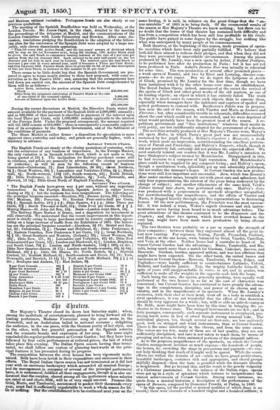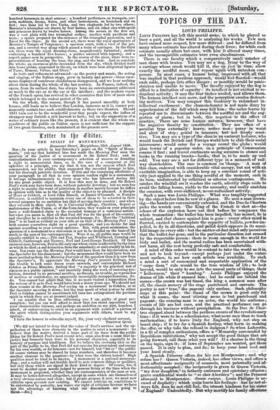'Cljt i4rattro.
Her Majesq's Theatre closed its doors last Saturday night ; when, among the mWfitnde of entertainments, planned to bring forward all the leading performers, Madame Fiorentini sang the great scene in the Freiachiitz, and an Andalusian ballad in national costume ; delighting the audience, in the one piece, with the German purity of her style, and in the other, with her graceful personation of the Spanish senorita and the romantic beauty and expression of her song. The same night concluded the regularperformances at Covent Garden ; but they have been followed by four extra performances at reduced prices, the last of which takes place this evening. The Italian Opera season having thus termi- nated, we shall follow our custom of glancing backwards at the prin- cipal features it has presented during its progress. The competition between the rival houses has been vigorously main- tained. Both have been lavish in their expenditure and strenuous in their efforts. The Royal Italian Opera season has not terminated as it did last year with an enormous bankruptcy which astounded all musical Europe ; and its management (a company of several of the principal performers) have, it is understood, fulfilled all their engagements, though it is also un- derstood that the surplus, shared among all the performers whose salaries are rated at and above 500i., will be of very small amount.. Persons like Grisi, Mario, and Tamburini, accustomed to pocket their thousands every year, must find it sufficiently unpalatable to work a whole season for lit- tle or nothing. But the establishment is to be continued next year en the same footing, it is said, in reliance on the great things that the " an- nus mirabilis " of 1851 is to bring forth. Of the commons/at results of the season at Her Majesty's Theatre we know nothing ; but them can be no doubt that the lessee of that theatre has sustained both difficulty and. loss from a competition which has been still less profitable to his rivals. The public have gained in some degree by the struggle, but nothing like what was anticipated by many people at its commencement
Both theatres, at the beginning of this season, made promises of opera- tic novelties which have been only partially fulfilled. We believe that both did their utmost to redeem their pledges, and that when they did not they were prevented by unavoidable circumstances. Among the pieces promised by Mr. Lumley, was a new opera by Auber, L'Enfant Prodigue, to be performed here after its production in Paris ; but it has not yet been produced in Paris. Aubees Domino Noir was actually in rehearsal for some time. The non-production of several other promised pieces— a weak opera of Rossini, and two by Ricci and Lortzing, obscure com- posers—we do not regret But we do regret the 1phigenia in Aulide of Gluck, promised by Mr. Lumley for the first time, though wo have been tantalized with it by the other house ever since its establishment. The Royal Italian Opera, indeed, announced at the outset the revival of the operas of Gluck and other great works of the old masters, as one of its leading objects ; an object in which it has entirely failed. The truth is, that it is much easier to conceive such objects than to execute them, especially when managers have the indolence and caprices of spoiled and petted performers to contend with. Beethoven's Fidelio was in prepara- tion near the end of the season, with Viardot and Mario as Leonora and. Floreatats ; but, after considerable trouble in rehearsals, difficulties occurred about the cast which could not be surmounted, and we were deprived of what would probably have been the greatest treat of the season. A re- publican government and "free institutions," whatever their merits in civil polity, are but indifferently adapted for the government of a theatre.
The novelties actually produced at Her Majesty's Theatre were, Mayeea old opera Medea, in which Pasta's great part was not unsuccessfully sustained by her pupil Parodi ; Capulefti e Montecchi, a weak work, which made no impression, notwithstanding the excellent perform- ance of Parodi and Frezzolini ; and Halevy's Tempena, which, though it did not positively fail, certainly did not produce the expected effect. Wo need scarcely remind our readers that it was Mr. Lumley's intention to have Shakspere's subject treated by Mendelssohn. Disappointed in this,. he had recourse to a composer of high reputation. But Mendelssohn's place could not be supplied by any composer living ; and Halevy's opera, though a meritorious work, splendidly got up and admirably performed, did not realize the manager's hopes. At Covent Garden the new produc- tions were still leas important and successful. Lora, which was Rossini's More under another name, brought out with great care and splendour, had only four representations, the interest of the piece being destroyed by the- change of subject ; and another rifacimento of the same kind, Verdi's Nabisco turned into Anate, was performed only once. Halevy's Jules was produced with a gorgeousness of spectacle altogether unequalled ; but notwithstanding this magnificence, and the efforts of Viardot and Mario, it dragged heavily through only five representations to decreasing houses. Of the new performances, the Freischiitz was the most success- ful: it was indeed a treat, Weber's superb choruses and rich instru- mentation never having been heard to so much advantage before. The great attractions of this theatre continued to be the Huguenots and the _Praline ; and these two operas, which drew crowded houses to the very last, might have been made more productive by being oftener repeated.
The two theatres were probably on a par as regards the strength of their companies ; between them they engrossed almost all the great ta- lent now existing. For sopranos, Sontag, Parodi, Frezzolini, Giuliani, and Hayes, at the one house, were balanced by Grisi, Viardot, Castellan, and Vera, at the other. Neither house had a contralto to boast of. In. tenors Covent Garden had the advantage ; Mario, Tamberlik, and Ma- ralti, being much more than a match for Gardeni, Calzolari, Reeves, and Baucarde. Gardoni, besides, appeared seldom, and was less efficient than might have been expected. On the other hand, the united basses and baritones at Covent Garden—Ronconi, Tamburini, Formes, Zelger, and Tagliafico—were hardly sufficient to counterbalance Lablache, Coletti„ Belletti, and Lablache junior. Nay, the mighty Lablache himself, in spite of years still unapproachable in voice, in art, and in genius, was. sufficient to make all the weights in the opposite scale kick the beam. Such being the case, the operas, generally s.aking, were equally well performed at the two houses in so far as the cast of characters was concerned ; but Covent Garden has continued to have greatly the advan- tage in the completeness, discipline, and power of its chorus and or- chestra, and in the magnificence of its spectacle. When Mr. Lumle3r's. orchestra, with their chef at their head, went off in a body to establish a rival operahouse, it was not wonderful that the effect of this desertion should be very apparent for a while ; but, with so able an aide-dc-camp as. Mr. Balfe, more might have been done by this time in bringing the or- chestra to its former state. The stringed instruments are too few ; and in forte passages, consequently, each separate instrument is overplayed, pro- ducing harsh noise in lieu of sweet though strong musical tone. The individual players, too, though several arc first-rate, are less uniformly
good, both on stringed and wind instruments, than at Covent Garden. There is the same inferiority in the chorus, and from the same cause. The voices are too few, many of them are of bad quality, they are not sufficiently disciplined, and care is not taken to teach them, by means of grouping and action, to form animated portions of the dramatic tableau. As to the gorgeous magnificence of the spectacle, on which the Covent Garden management lavishes so much expense—the hundreds of people, the horses, &e. crowding the stage in processions and pageants—we can- not help thinking that much of it might well be spared. While the scenic effects are within the domain of art—while we have grand architecture, beautiful landscapes, costumes rich and appropriate, and choral groups skilfully disposed—then the taste is gratified while the dramatic illusion is heightened. But go beyond this, and the result is the gawdy vulgarity
of a Christmas pantomime. In the infancy of the Italian stage, operas were got up in a style of splendour which reduces to insignificance the utmost achievements of Covent Garden. Among many instances, we- quote from a musical historian a description of the performance of the opera of Berenice, composed by Domenico Freschi, at Padua, in 1680. " 111 this opera, (of the poetical or musical qualities of which there is no record,) there were choruses of a hundred virgins and a hundred soldiers; a hundred horsemen in steel armour ; a hundred performers on trumpets, cor- nets, sackbuts, drums, Mites, and other instruments, on horseback and on foot; two lions led by two Turks, and two elephants led by two others; Berenice's triumphal car drawn by four horses, and six other cars with spoils and prisoners drawn by twelve horses. Among the scenes in the first act, was a vast plain with two triumphal arches; another with pavilions and tents ; a square prepared for the entrance of the triumphal procession, and a forest for the chace. In the second act, there were the royal apartments of Berenice's Temple of Vengeance ; a spacious court, with a view of the pri- son, and a covered way along which passed a train of carriages. In the third act, there were the royal dressing-room magnificently furnished ; stables containing a hundred live horses ; a pOrtico adorned with tapestry, and a superb palace seen in perspective. In the course of the pieceAnd. there were re-
presentations of hunting the boar, the stag, and the bear. to conclude the whole, an enormous globe descended from the sky, which divided itself into lesser globes, suspended in the air, on which were seen allegorical figures of Fume, Honour Virtue, and Glory."
As taste and refinement advanced—as the poetry and music, the acting rand singing, of the Italian stage, grew in beauty and power—these enor- mous, displays of cumbrous childishness disappeared, and wo hear nothing about them during the whole of the last century. In France, indeed, the opera, from its earliest date, has always been an entertainment addressed as much to the eye as to the ear or the intellect; and the modern vogue of the French opera has revived in other countries that love of mere show which belonged to the rudest period of the art. On the whole, this season, though it has passed smoothly at both houses, still leads us to believe that London, immense as it is, cannot per- manently sustain two such establishments as these two theatres. Should 1851 turn out to be the wonderful year that people expect, the influx of strangers may furnish a rich harvest to both ; but on the supposition of a series of ordinary years like the present, it is evident that the whele ex4 penditure of the public on Italian opera is not sufficient for the support of two, great theatre; each maintained at the present cost.



























 Previous page
Previous page